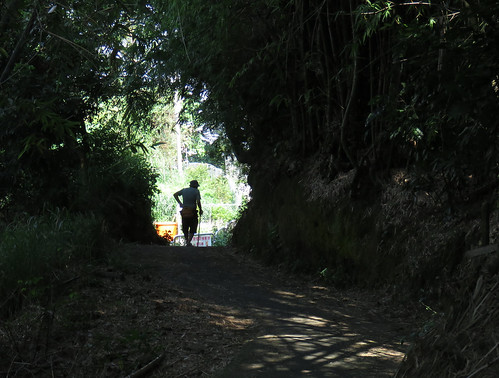The Taipei Times featured an interview with the new Minister of the Interior, Hsu Kuo-yung, today...
According to official statistics, there were more than 450,000 criminal cases in 2008, but by last year, the number across the nation had dropped to 290,000 — including fighting and slander cases.Those numbers seem suspicious to me. The crime statistics are based on what reports the police choose to handle, and that precipitous fall looks like the police are being choosy about what they put into their official casebooks. Anthropologist Jeff Martin explained how this works years ago:
Last year’s amendments to the Organized Crime Prevention Act (組織犯罪防制條例) allow judges to hand down heavier sentences, and help the police to crack down on the sudden spike in telecommunications scams that occurred in previous years.
"You have to recognize that the policeman himself is just a pawn in this much larger political game," Jeff said. The policeman have no particular stake in the theft of your motorcycle, but somewhere above their heads is "some idiot who has said that if the crime rate goes up, I will resign." There is no way to effectively decrease the scooter theft rate, and no way to increase the recovery rate. The only way to influence the crime rate short of a miracle, is to influence the crime statistics. These become "very real political pressures," he explained, on the local substation commanders. "If your substation reports more than 15 motorcycles stolen this month, you are not getting a promotion." Essentially, Jeff said, laughing, this becomes "you have 15 motorcycle theft reports -- use them wisely."....although as the interview notes further down, the number of homicide cases has halved since 2008, so maybe the fall in crimes is real rather than an artifact of police reporting methods. At the end of the interview the Minister said...
Separately, the ministry is to implement a “third-party policing” strategy that integrates the authority and resources of other administrative agencies, such as fire departments, revenue services, civil defense groups, construction management offices, building managers and business owners.This focus on obvious sites of prostitution has the salutary effect of cracking down on funding sources for A Certain Political Party which happens to be the DPP's rival, and of pleasing middle class moralists. Since these rise and die like mushrooms, the effect will be ephemeral.
The ministry will appoint liaisons and carry out joint inspections; actively investigate the settings that gangs invest in, manage or guard; increase spot checks on the “eight major industries” — karaoke bars, nightclubs, dance halls, clubs, cafes and tearooms, bars, barbershops and saunas in which illegal activities, such as prostitution, often occur — and cut off gangs and other criminal organizations’ sources of funding.
Readers may recall that when Chen Shui-bian was mayor of Taipei, he shut down all the brothels and pachinko parlors and similar in the city. They re-opened when Ma Ying-jeou became mayor.
This representation of "gang activity" is conventional and reassuring. It divides Taiwanese society into nice people and people infected with vice, and gives the appearance that the government is actually doing something. Meanwhile, organized crime investment in things like construction firms, temple associations, bus companies, coffee shops, cram schools, large private schools, street vendors, betel nut stands, stir-fry restaurants and tens of thousands of other, ordinary, businesses, will remain, as always, ignored.
In the Real Taiwan, we all do business with organized crime.
_______________________
[Taiwan] Don't miss the comments below! And check out my blog and its sidebars for events, links to previous posts and picture posts, and scores of links to other Taiwan blogs and forums!

It used to be gangsters doing gangland business. Then the gangsters decided they needed to become businessmen to use legitimate business to support illicit enterprise. Then they realized they needed to become politicians to set their own tables for both black and white sides of their interests. Now, any gangster with any kind of standing leaves becoming a politician to the faction heads and has found that being a tycoon is more then enough to buy both businessmen and politicians.
ReplyDeleteI noticed the weed dried up under Ma. Do the greens control the green?
ReplyDelete